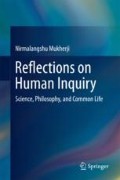Abstract
In both realist and non-realist conception of (scientific) theories, the standard view is that theories are identified by the objects they are about; it is just that the non-realist withholds reality for those objects. It is argued in this chapter that the notion of basic objects that are sustained through theory-change is suspect. This is because, during theory-change, the domains of explanation also change. Since a theoretical domain is identified by the structure of its basic objects, it follows that during theory change those objects also change. If they change, why should they be viewed as basic? The argument is illustrated with a detailed study of theoretical linguistics . It is shown that, as the study of language shifted from ancient Paninian concerns to contemporary generative grammar, the basic vocabulary and focus of theory changed so much that it is difficult to see that Panini and Chomsky are studying the same domain in their theories. More significantly, such radical shifts can be detected within the different phases of generative grammar itself. Finally, the phenomenon of lost domain is not restricted to linguistics. Current attempt in physics to somehow unify the quantum and relativity theories seems to result in a similar form of domain-shift. So, the notion of what theorists are talking about is not perspicuous.
But there is nothing in the real world corresponding to language. In fact, it could very well turn out that there is no intelligible notion of language.
Noam Chomsky
This is a revised version of a paper published as Mukherji (2001).
Access this chapter
Tax calculation will be finalised at checkout
Purchases are for personal use only
References
Arsenijevic´, B., and W. Hinzen. 2012. On the Absence of X-within-X Recursion in Human Grammar. Linguistic Inquiry, Volume 43, Number 3, 423–440.
Berwick, R., and N. Chomsky. 2016. Why Only Us: Language and Evolution. Cambridge: MIT Press.
Bromberger, S., and M. Halle. 1991. Why phonology is different. In The Chomskyan Turn, A. Kasher (Ed.), 56–77. Oxford: Basil Blackwell.
Chomsky, N. 1981. Lectures on Government and Binding. Dordrecht: Foris.
Chomsky, N. 1982. Some Concepts and Consequences of the Theory of Government and Binding. Cambridge: MIT Press.
Chomsky, N. 1991. Linguistics and adjacent fields: A personal view. In The Chomskyan Turn, A. Kasher (Ed.), 1–25. Oxford: Basil Blackwell.
Chomsky, N. 1995. The Minimalist Program. Cambridge: MIT Press.
Chomsky, N. 2000. The Architecture of Language. In N. Mukherji, B.N. Patnaik, R. Agnihotri (Eds.). New Delhi: Oxford University Press.
Chomsky, N. 2015. What Kind of Creatures are We?. New York: Columbia University Press.
Everett, D. 2005. Cultural constraints on grammar and cognition in Pirahã. Current Anthropology 46: 621–646.
Fodor, J. 1994. The Elm and the Expert. Cambridge: MIT Press.
Fodor, J. 1998. Concepts: Where Cognitive Science Went Wrong. Oxford: Clarendon Press.
Halle, M. 1995. Feature geometry and feature spreading. Linguistic Inquiry 26: 1–46.
Harley, H., and R. Noyer. 1999. State-of-the-article: Distributed morphology. GLOT International 4 (4): 3–9.
Larson, R., and G. Segal. 1995. Knowledge of Meaning. Cambridge: MIT Press.
Mukherji, N. 2000. The Cartesian Mind: Reflections on Language and Music. Shimla: Indian Institute of Advanced Study.
Mukherji, N. 2001. Shifting domains. In Basic Objects, A. Raina, and M. Chadha (Eds.). Indian Institute of Advanced Study: Shimla.
Mukherji, N. 2003. Is CHL linguistically specific? Philosophical Psychology 16 (2): 289–308.
Mukherji, N. 2010. The Primacy of Grammar. Cambridge: MIT Press.
Quine, W.V.O. 1953. On what there is. In From a Logical Point of View. Cambridge: Harvard University Press.
Penrose, R. 1994. Shadows of the Mind. Oxford: Oxford University Press.
Penrose, R. 2001. Conversation. In Mind, Matter and Mystery: Questions in Science and Philosophy, R. Nair (Ed.), 119–133. New Delhi: Scientia.
Author information
Authors and Affiliations
Corresponding author
Rights and permissions
Copyright information
© 2017 Springer Nature Singapore Pte Ltd
About this chapter
Cite this chapter
Mukherji, N. (2017). Theories and Shifting Domains. In: Reflections on Human Inquiry. Springer, Singapore. https://doi.org/10.1007/978-981-10-5364-1_4
Download citation
DOI: https://doi.org/10.1007/978-981-10-5364-1_4
Published:
Publisher Name: Springer, Singapore
Print ISBN: 978-981-10-5363-4
Online ISBN: 978-981-10-5364-1
eBook Packages: Religion and PhilosophyPhilosophy and Religion (R0)

